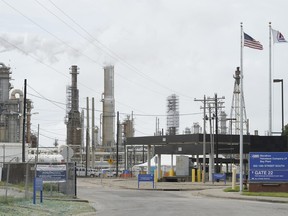Alberta a key player in new story about Canada-U.S. trade

Article content
Canada literally lives or dies on trade with the U.S. We tell the Americans how important trade is and what great neighbours we are. But this message no longer works (if it ever did). Trade has become a dirty word in the U.S.
For populist economists and political commentators on the right and left, economic orthodoxy is that trade has caused the destruction of the U.S. middle class and communities across the country. Trade deficits are the quantifiable indicator of the problem — the canary in the coal mine of further job loss and community devastation.
This is seen most clearly in the trade chapter of the Heritage Foundation’s Project 2025 report, the blueprint for a second Trump administration, written by a key trade architect in the Trump Whitehouse, Peter Navarro.
Correct or not, this orthodoxy is a problem for countries with huge trade surpluses with the U.S. such as Canada, which has the second-largest trade surplus with the U.S., after China. Being second to China on anything, especially something the Americans consider a problem, is trouble. And in the run-up to the 2026 North American trade agreement — this is particularly concerning.
Except potentially in this case.
Opposed to China, Canada’s enormous trade surplus with the U.S. is largely Alberta and Saskatchewan oil and gas — a clear, direct benefit for the U.S. and not the problem MAGA economists and progressives portray.
For consumer goods, steel and other products from China, these economists may have a point about imports taking U.S. jobs. But Canada, and specifically its largest energy exporters Alberta and Saskatchewan, is not China.
With our oil and gas exports, U.S. workers are put to work, not out of work, as they process our heavy crude and natural gas for U.S.-based companies to export. For natural gas alone, in 2022 Canadian exports to the U.S. created more than US$1 billion in wages and 7,000 good, middle-class jobs. And that doesn’t include the jobs attributed to processing Canadian gas to export from LNG facilities in Texas and Louisiana. Our crude oil is refined in U.S. refineries, creating even more jobs.
We do not effectively communicate this difference to Americans and certainly not to the MAGA and progressive communities. Canada continues to trot out the tired “trade is good, and we are your largest trade partner” mantra. In the current U.S. political context, trade is not automatically considered “good” and the connection between “largest trade partner” and any benefit to the listener is too abstract a concept for modern audiences.
We need a new language to speak to the new America. “We export jobs to the U.S.” is the simple, direct new language needed to speak to the new U.S. and effectively respond to its Navarros.
But because this particular story is best told via oil and gas, it will not be told by Ottawa even though it is a story that benefits all of Canada, including those that don’t want it told.
As the federal government develops a playbook and talking points for a Team Canada approach to the U.S., there is a need for an Alberta and Saskatchewan “we export jobs” insert to accompany and supplement the federal government script.
When negotiations with the Americans get difficult and irritants such as supply management threaten to swamp everything else, “we export jobs” is the story that may save the day. But only if it is told, loudly and repeatedly.
Whether MAGA or progressive, the line will resonate with federal, state and local officials. It is also a line best told by Alberta and Saskatchewan, hopefully with others eventually joining.
Gary Mar is president and CEO at the Canada West Foundation; Carlo Dade is director of trade and trade infrastructure.






Postmedia is committed to maintaining a lively but civil forum for discussion. Please keep comments relevant and respectful. Comments may take up to an hour to appear on the site. You will receive an email if there is a reply to your comment, an update to a thread you follow or if a user you follow comments. Visit our Community Guidelines for more information.